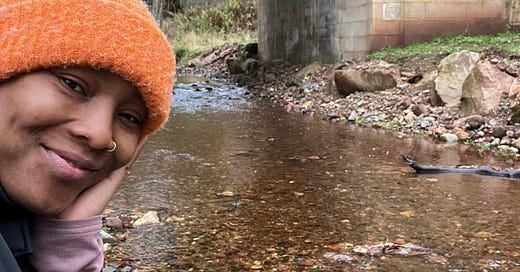This week I’m feeling like a writer from a rom-com. Think The Holiday. I’m lucky enough to be in the Scottish borders in the most enchanting location. I’m currently sitting on the third floor of a tower, log burner going, as I try to make sense of my second novel.
One thing I’ve been thinking about a lot, and this is more of a conversation starter than it is a summation of my fully fledged thoughts, is where we get our inspiration when it comes to fiction writing.
This time around, I am writing a book that closely links to an experience I have had. The characters aren’t explicitly me and my dad but the themes are very close to me. Themes of loss and navigating that journey together, longing for understanding, family history, the pain of my father’s experience and the joy too. The awkward, silly, strange and funny moments in crisis where things should really not be making you laugh, but you can’t help but do so, because of the absurdity of the situation you find yourself in.
I’m acutely aware that my dad isn’t able to formally or verbally consent to me writing about our grief journey, or about his experience of diagnosis and death. I’m feeling my way through this by thinking that not only was his last journey his, but it was mine too — a shared grief that now stretches across the divide between the present me and my memories of him. Both of us were shaped by his life and subsequent death. But that doesn’t make it easy — in fact, quite the opposite. I feel a responsibility to write something that is true, respectful, and honours the pain, love, and all the messiness in between, while still acknowledging that it’s not exactly us. It’s about the feelings we experienced, rather than a direct re-telling. This is how I try to approach much of my work.
Recently I’ve seen lots of conversations online highlighting instances where people’s lives and experiences have also been used in books. Be it for characters or plot devices. Sometimes with, but often times without, consent. It’s definitely not the first time these questions have cropped up — this conversation seems to be consistently in the ether.
So, when do we ask whose story it is to tell? Where does the line between inspiration and appropriation blur?
I have been having lots of interesting conversations with friends about this recently. Acknowledging there are times in which it is important for writers to make sense of the experiences they are adjacent to, inside of, or have a different perspective on. However I’ve also been thinking about the difference between inspiration versus directly lifting in a way where it feels like imagination has not been applied. How we might feel about a writer’s right to do so will of course be impacted by the power dynamics that come into play. I’m thinking about when cultures are ripped off or where credit is not given. When inspiration has been acknowledged it feels like slightly more black and white territory.
But there are lots of situations within this that spark debate. Where people feel very strongly about how a retelling or a story should have been ushered into the world. Baby Reindeer brought to the forefront the case for protecting real people on whom such characters are based for example. As a writer, my work is how I make sense of my world. It’s an important part of my processing and I know for so many others it can offer a similar solace — one which enables you to push forward. But I do often think, when lines of communication are open, there should be conversations with the people that find their way into our work in a significant or identifiable way. I’m not speaking about how a character might look, or a quirk they possess, but the undeniable resemblance of a character or story.
What do you think? Would you be upset if your likeness showed up in somebody else’s body of work? Is it ok that writers borrow from other people’s lives in this way? At what point does it move from inspiration to something else?





